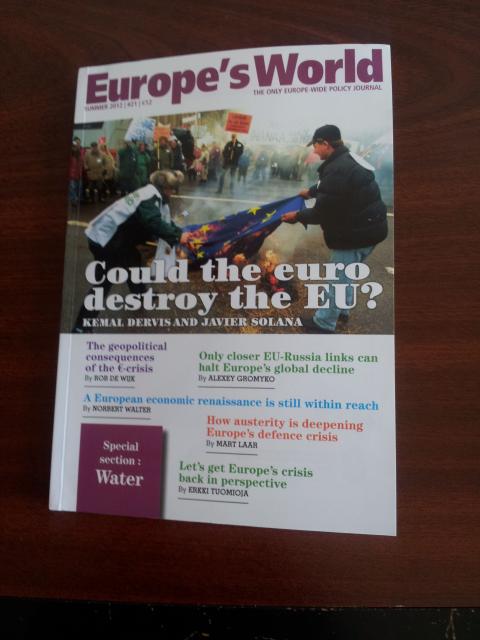Recent publications of CENS-team: Péter Balázs, Áron Szele and Zselyke Tófalvi

Péter Balázs: Yes, but there are also questions surrounding an EU of 36 countries
(Europe's World, Summer 2012/#21)
Professor Peter Balazs, the director of the Center for EU Enlargement Sudies (CENS) and former Minister of Foreign Affairs of Hungary, commented on the future of an enlarged European Union in the Summer 2012 issue of Europe's World. He referred to Enlargement as a soft power tool for the EU and discussed its far reaching consequences for both the union itself and its neighborhood. Potential future enlargements will challenge both the EU's economic development policy, since it places it in the immediate vicinity of "real" peripheries at its eastern end, and its ability to accommodate changes reflecting a different balance of power between its members, especially from the perspective of Turkey as a potential future EU member.
Áron Szele - Zselyke Tófalvi: The extreme right images of minorities in Hungary and Great Britain
(Pro Minoritate, Summer 2012)
One of the main themes of current-day European politics is the question of immigration and minority policy. The topic has been pushed to the fore more recently by a surge of right-wing extremist political formations. The present essay seeks to provide an overview of the manner in which these parties portray ethnic and religious minorities in their public discourse. The essay argues that geographical, political, historical and cultural differences notwithstanding, the minority image painted by the extreme right conforms to a certain logic, which is generally applicable in the European setting. A comparative study of two spatial poles of right-wing extremism shall support the theoretical statements. The article explores the commonalities and differences between the image of minorities displayed be two European radical right-wing parties, the British National Party and the Jobbik-Movement for a Better Hungary. The article analyzes discourses and political rhetoric of these political organizations and does a thematic comparative study of them.
Áron Szele: Extraordinary situations-extraordinary means: The regenerative projects of theHungarian radical right yesterday and today
(CEU Political Science Journal, April 2012, Vol.7, No.2)
Aron Szele's article attempts to provide an example in which the historical methodmay be used as a tool to define and study the ideology of the radical right. Itdoes this by using Hungary as a case-study and explores the questions ofcontinuity, core ideas, and inner logic of radical right wing discourses. Thevehicle used is a diachronic comparison of regenerative planning in the interwar andcontemporary period, concentrating on the main themes of ideological content. Theessay shows an interesting amount of commonalities between the though-patternsof interwar and present radical right wingers in Hungary. The past and present manifestations of radical right wing ideology are analysed and compared in his historical study of their ideology.
The full article can be accessed at: http://www.ceu.hu/sites/default/files/field_attachment/page/node-5699/ceupsj72_1.pdf
